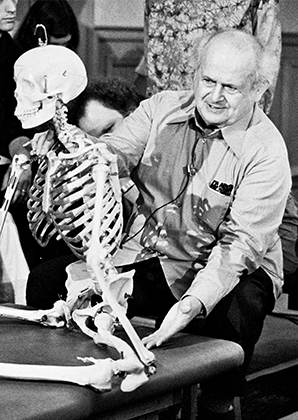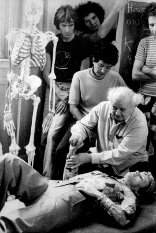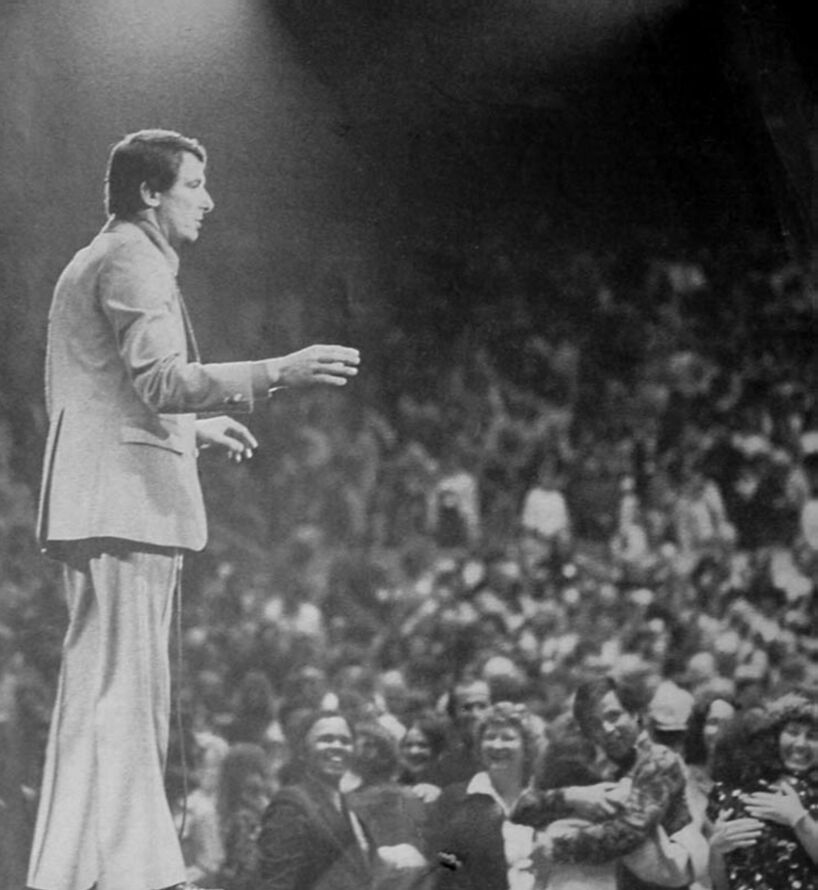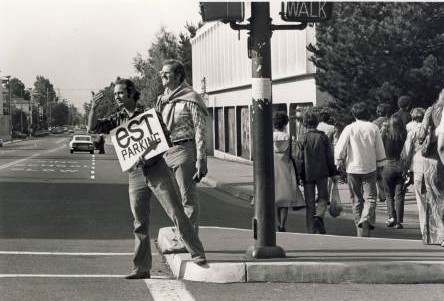The openings of two People articles from several decades ago about a couple of radically different seminar teachers, Moshe Feldenkrais and Werner Erhard, who wanted to help you be the best you that you could be.
From Jon Keller and Bonnie Freer’s 1981 piece, “His Methods May Seem Bizarre“:
Israeli scientist Moshe Feldenkrais is not easily impressed. Over the years he has treated thousands of people, from statesmen (Israel’s first Prime Minister, David Ben-Gurion) to violin virtuosos (Yehudi Menuhin), with his unique method of movement that—he claims and his disciples devoutly believe—results in a kind of heightened self-awareness and improved physical coordination.
So when Julius Erving, the Philadelphia 76ers’ $550,000-a-year star hoopster, recently became interested in the work of the 77-year-old mind-body guru, even Dr. J got a dose of Feldenkrais’ characteristic crankiness. “There shouldn’t be any professional athletes,” huffs Feldenkrais. “Everyone should be athletic. But if someone wants to sell his skills, it’s his business—not mine.”
Erving and more than 200,000 people from Tel-Aviv to Argentina regard Feldenkrais’ curmudgeonly ways as small price to pay for learning what he calls “Awareness Through Movement.” Essentially, the Feldenkrais Method is a program of exercises that suggest mind over matter, with the body programming the brain so that the whole system works in a new way.
Feldenkrais concedes there are no simple explanations for his approach (he even scoffs at such attempts), but it is akin to the “patterning” technique widely used to treat retarded children. Patterning involves repeated manipulation of the limbs, and the feedback from these motions stimulates the brain to accept the movements as normal.
“I am not interested in the movements themselves,” explains Feldenkrais, “but rather in how you do them. Any movement which is difficult and done over and over again can actually reorganize molecules in the brain and the way they send impulses.” Taking his mind-body philosophy on the road, Feldenkrais has just completed a four-day-a-week, nine-week training course for 235 of his pupils at Hampshire College in Amherst, Mass. Fee: $2,000 per person. This week Feldenkrais is leading a four-day workshop in Washington, D.C. before heading home.•
___________________________
From 1975’s “Werner Erhard“:
“I wanted to get as far away from Jack Rosenberg as I could get,” explains Werner Erhard. His reason is clear: Jack Rosenberg was a loser. Born in Lower Merion, Pa., Rosenberg married at 18, fathered four children and worked as a construction company supervisor—until he dropped out in 1960. Leaving his family, he took off for St. Louis with a girlfriend (now his second wife and mother of three). To start fresh, Rosenberg adopted space scientist Wernher von Braun‘s first name (misspelling it) and former West German Chancellor Ludwig Erhard’s last name. “Freudians,” Werner Erhard concedes, “would say this was a rejection of Jewishness and a seizure of strength.”
The rest of Erhard’s spiritual hegira has become legend among his cult. For eight years he worked as a crackerjack instructor of encyclopedia salesmen. Then one morning while driving down the freeway south of San Francisco, to which he moved in 1964, he was suddenly struck by the realization that “I was never going to make it. No matter how much money or recognition I achieved, it would never be enough.”
To overcome this hopelessness, Erhard experimented with just about every method guaranteed to bring peace of mind. “I tried yoga, Dale Carnegie, Zen, Scientology, encounter groups, t-groups, psychoanalysis, reality therapy, Gestalt, love, nudity, you name it,” he recalls. “But when it was over, that was not it.”
Once again, Erhard was behind the wheel when he finally “got it”—a religious happening that the faithful call “The Experience.” And what is ‘it’? Replies the Master: “What is it, is it. When you drop the effort to make your life work, you begin to discover that it’s perfect the way it is. You can relax. It’s all going to unfold.”
Not much of a message, perhaps, but as packaged, promoted and proselytized by Erhard in a two-weekend, 60-hour course (price $250), his movement, known as est (Latin for ‘it is,’ as well as Erhard Seminars Training), has turned out more than 63,000 converts in 12 U.S. cities. Another 12,000 hopefuls are on the waiting list. Among the alumni of est’s psychic boot camps are Emmy winner Valerie Harper (who thanked Erhard on TV for changing her life), Cloris Leachman, John Denver, astronaut Buzz Aldrin and activist Jerry Rubin.•
Tags: Bonnie Freer, Jon Keller, Moshe Feldenkrais, Werner Erhard




